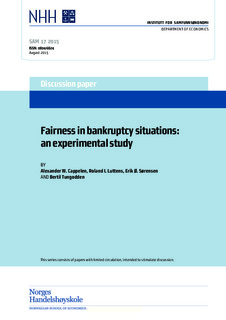| dc.description.abstract | The pari passu principle is the most prominent principle in the law of insolvency.
We report from a lab experiment designed to study whether people
find this principle a fair solution to the bankruptcy problem. The experimental
design generates situations where participants work and accumulate
claims in firms, some of which subsequently go bankrupt. Third-party arbitrators
are randomly assigned to determine how the liquidation value of the
bankrupt firms should be distributed between claimants. Our main finding
is that there is a striking support for the pari passu principle of awarding
claimants proportionally to their pre-insolvency claims. We estimate a random
utility model that allows for the arbitrators to differ in what they consider
a fair solution to the bankruptcy problem and find that about 85 percent of the
participants endorse the proportional rule. We also find that a non-negligible
fraction of the arbitrators follow the constrained equal losses rule, while there
is almost no support in our experiment for the constrained equal awards rule
or other fairness rules suggested in the normative literature. Finally, we show
that the estimated random utility model nicely captures the observed arbitrator
behavior, in terms of both the overall distribution of awards and the
relationship between awards and claims. | nb_NO |
